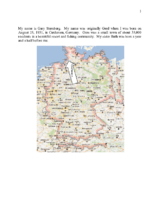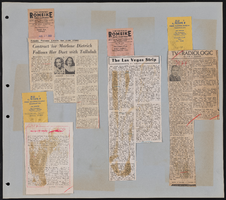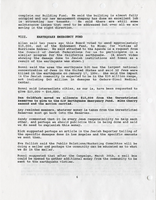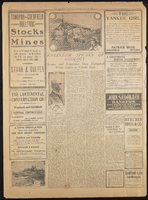Search the Special Collections and Archives Portal
Search Results

Biographical essay by Gary Sternberg, 2014
Date
Archival Collection
Description
Gary Sternberg grew up in Germany, witnessing anti-Semitic propaganda as early as age 7. He describes some of the experiences his father endured at a concentration camp, and his escape to China. He and his mother reunited with his father in Shanghai in 1940. They left Shanghai in 1948, eventually settling in Cleveland. He and his family came to Las Vegas in 1969.
Text

Transcript of interview with Kenny Epstein by Barbara Tabach, May 1, 2015
Date
Archival Collection
Description
On a pleasant spring evening at sundown in April 2017, a Pop-Up Shabbat draws a crowd of Jews to the Jackie Gaughan Parkway at the El Cortez Hotel & Casino. Proudly, and quietly, watching from the sideline is Kenny Epstein, owner of the El Cortez. He seeks no recognition, but is enjoying the gathering for Sabbath services and the music that will fill the air. Kenny Epstein is also a classic enthusiast of Las Vegas history. The nostalgia is evident as one walks through the casino and reinforced by the stories of a man who has experienced the city’s growth since moving here in 1959 at the age of 18. The timeline of Kenny’s teen years begins with his bar mitzvah in Chicago and a story of prizefighter Rocky Marciano giving a brief toast. When he was 15, his parents, Ike and Adele Epstein, took the family to visit Las Vegas. About three years later, his father became an executive at the Stardust. Kenny’s own imprint on Las Vegas history was just beginning. In this brief interview, he mentions an illustrious list of mentors and recalls many historic moments from the history of the Las Vegas Strip. All of which led to his ownership of The El Cortez—advertised as the longest continuously operating hotel/casino.
Text
Irwin and Susan Molasky Papers
Identifier
Abstract
The Irwin and Susan Molasky Papers (early 1900s-2012, bulk 1970-2012) primarily contain materials related to real estate development work by Irwin Molasky with his company, the Molasky Group of Companies, in Las Vegas, Nevada. In addition, the collection includes personal photographs (early 1900s-2011, bulk 1970-2011) of family members, friends, and events, as well as a Proclamation from Clark County, Nevada to establish the Molasky Family Park.
Archival Collection

William McLeod interview, March 16, 1978: transcript
Date
Archival Collection
Description
On March 16, 1978, Valerie McLeod interviewed her father William Lee McLeod (b. January 31st, 1937 in Los Angeles, California) about his life in Las Vegas, Nevada. McLeod begins by speaking about his career as a contractor, the growth of Las Vegas and the city’s population. Moreover, he speaks about recreational activities such as riding motorcycles and exploring mines around Nevada. McLeod also spends time going over Indian reservations around Nevada and neighboring states, the Lost City in Nevada, boomtowns and ghost towns. Lastly, McLeod talks about the history of water and springs in the state of Nevada, what he would consider to be the Old Ranch and the stagecoaches that passed through Gold Point, Nevada.
Text

Transcript of interview with Sally L. Jackson by Krista Jenkins, March 2, 1980
Date
Archival Collection
Description
On March 2, 1980, collector Krista Jenkins interviewed assistant manager, Sally L. Jackson, (born March 28th, 1932 in Culver City, California) in her home in Las Vegas, Nevada. The interview covers the social and environmental changes that have occurred in Las Vegas. Sally also discusses the hospitality industry and offers details on the local hotels, casinos, and nightclubs in Las Vegas, Nevada.
Text

Transcript of interview with Phyllis Webb Clark by Lorna Suzette Clark, April 7, 1976
Date
Archival Collection
Description
On April 7, 1976, Lorna Suzette Clark interviewed her mother-in-law, Phyllis Webb Clark (born 1928 in Los Angeles, California) about her experiences from living in Las Vegas. The two first discuss education, the various address at which Phyllis lived, and the early development of the Strip and Downtown areas. The interview then covers the visits of important individuals, forms of transportation, the effect of World War II on the economy, and the effects of the growing town on hospitality and courteousness. Phyllis also mentions the Helldorado Parade, her involvement in Boy Scouts and Girl Scouts, and recreational activities. The interview concludes with a discussion on the atomic testing, the Stewart Ranch, and floods in Las Vegas.
Text




